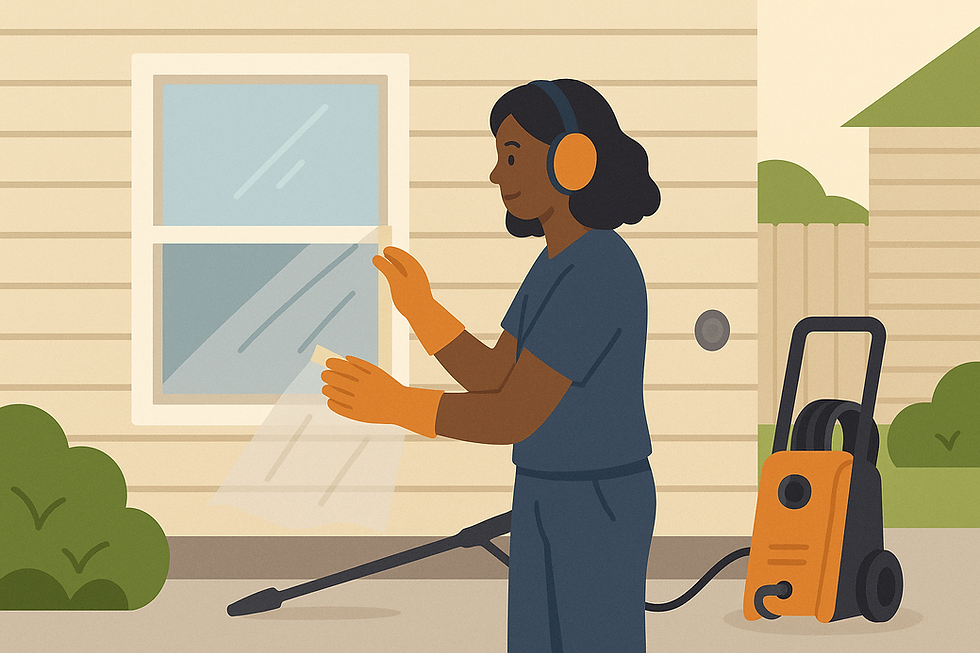Pressure Washing vs. Soft Washing: What’s the Difference?
- Vanessa Brown
- Sep 23, 2024
- 4 min read
Updated: Mar 12, 2025
When it comes to cleaning the exterior surfaces of your home or commercial property, two of the most popular methods are Pressure Washing vs. Soft Washing. Although they may seem similar at first glance, these two cleaning techniques have distinct differences in how they work, the type of surfaces they’re best suited for, and the results they provide. Understanding the difference between pressure washing vs. soft washing can help you choose the right method for your specific cleaning needs.

What is Pressure Washing?
Pressure washing, also known as power washing, is a cleaning method that uses high-pressure water to remove dirt, grime, mould, mildew, and other contaminants from various surfaces. It involves the use of a machine that pumps out water at a high PSI (pounds per square inch), which can range from 1,500 to 4,000 PSI or more, depending on the type of machine used.
Pressure washing is ideal for cleaning hard, durable surfaces that can withstand the force of high-pressure water. These surfaces typically include:
Concrete driveways
Sidewalks
Patios
Brick walls
Decks (made from durable materials like composite or treated wood)
Because of its intense power, pressure washing is extremely effective at blasting away stubborn stains and buildup. However, it’s not suitable for all surfaces. The strong pressure can cause damage to softer materials, strip away paint, or even etch into the surface of certain materials if used improperly.
What is Soft Washing?
Soft washing, on the other hand, is a gentler cleaning method that uses low-pressure water combined with specialized cleaning solutions. Instead of relying on the force of water to remove dirt, soft washing relies on cleaning agents to break down contaminants, mould, algae, and bacteria. The low-pressure rinse (usually under 500 PSI) is then used to wash away the loosened grime.
Soft washing is best suited for more delicate surfaces that could be damaged by high-pressure water. These include:
Roof shingles (especially asphalt or tile)
Painted surfaces
Vinyl siding
Wooden fences
Stucco
Outdoor furniture
One of the biggest advantages of soft washing is that the cleaning agents used are often designed to not only clean but also sanitize surfaces, making it an effective method for removing organic growths like mould, algae, and bacteria. This means that soft washing provides longer-lasting results, as it addresses the underlying cause of the stains or buildup, rather than just the surface grime.
Pressure Washing vs. Soft Washing: Which One Should You Use?
The key difference between Pressure Washing vs. Soft Washing lies in the level of pressure used and the type of cleaning solution involved. Choosing the right method depends on the surface you need to clean and the type of contaminants you're dealing with.
Here’s a quick breakdown to help you decide:
Pressure Washing:
Best for hard, durable surfaces like concrete, brick, and stone
Ideal for removing tough stains, oil spills, graffiti, and heavily caked dirt
May cause damage to softer materials if not used carefully
Can be done without chemicals, making it an eco-friendly option for some surfaces
Soft Washing:
Best for delicate surfaces like roofs, painted wood, or siding
Ideal for removing mould, algae, mildew, and bacteria
Uses eco-friendly cleaning solutions to ensure long-lasting results
Gentle and safer for surfaces that might be damaged by high-pressure water
Benefits of Professional Cleaning Services
While pressure washing and soft washing may seem like DIY-friendly tasks, hiring a professional can ensure that the job is done effectively and safely. A trained expert will know the appropriate method to use for each surface, preventing any accidental damage to your property.
Prevention of Damage: Incorrect use of a pressure washer can lead to cracked surfaces, damaged paint, or warped wood. Professionals can gauge the correct pressure settings and use the right solutions to avoid such issues.
Better Results: Professionals use high-quality equipment and cleaning solutions that can achieve a deeper clean than most home systems. Additionally, they understand how to properly treat and prevent the return of contaminants like mould and algae.
Time and Effort Saving: Cleaning large areas such as driveways, roofs, and house exteriors can be time-consuming and physically demanding. Professional services can handle these tasks efficiently, allowing you to focus on other aspects of home maintenance.
In the debate of Pressure Washing vs. Soft Washing, the best choice depends on your cleaning needs and the specific surfaces you want to maintain. Pressure washing is powerful and effective for tough surfaces, while soft washing provides a gentler, longer-lasting clean for more delicate areas. When in doubt, consult with a professional cleaning service to ensure your property is cleaned safely and effectively.
*****
Ready to restore your home’s exterior to its original beauty? Contact us today for professional pressure washing and soft washing services tailored to your specific needs. Get a free quote and let our experts ensure your surfaces are cleaned safely and effectively!


